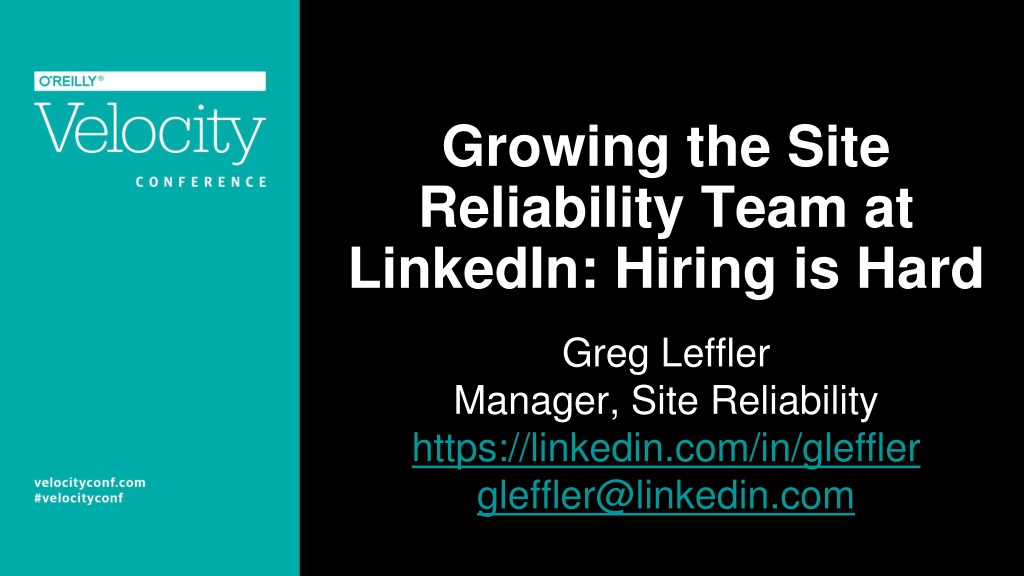LinkedIn Site Reliability Team Growth Insights
LinkedIn's Site Reliability Team Manager, Greg Leffler, shares hiring challenges and insights on team development from 2011 to 2014. The team comprises over 100 SREs across five sites, embracing cultural values and skills alignment for recruitment. The emphasis on talent, culture, and technical skills in hiring processes is highlighted, along with the importance of setting clear job criteria. The content showcases LinkedIn's commitment to employee growth and transparent culture.
Download Presentation

Please find below an Image/Link to download the presentation.
The content on the website is provided AS IS for your information and personal use only. It may not be sold, licensed, or shared on other websites without obtaining consent from the author. Download presentation by click this link. If you encounter any issues during the download, it is possible that the publisher has removed the file from their server.
E N D
Presentation Transcript
Growing the Site Reliability Team at LinkedIn: Hiring is Hard Greg Leffler Manager, Site Reliability https://linkedin.com/in/gleffler gleffler@linkedin.com
Who am I? Site Reliability Manager (New York) MS in Industrial/Organizational Psychology Responsible for interview process for SREs - Took this responsibility as an IC, so originated from the bottom up Team grew 10x from August 2011 to May 2014
Who are SREs at LinkedIn? 100+ SREs 5 sites, 2 countries 1000+ SW Engineers 8thbusiest website in the world 10k+ prod machines per DC: 2 DCs today +1 in 2014 300+ RESTful services, 300MM+ members Services with 99th%ile latencies as low as 10 ms
What matters for a great company? Funding? Good idea? Execution? Product? People.
Obligatory LinkedIn culture plug Talent is our #1 operating priority. Our culture is what sets us apart. We are committed to supporting the career transformation of our employees. Transparency is encouraged and emphasized at every company all- hands meeting - Which occur every other week Our commitment to our employees is emphasized in how we behave - Everyone is encouraged to do interviews! Yes, everyone. - ~60% of SREs participate in the interview process
What do we want from SREs? Excited about LinkedIn and the SRE role - We have the luxury of being picky Fit our culture and embody our values - These matter. If you haven t set them or can t articulate them, you need that 1st Have the skills needed to do the job - These also matter. You need to know what these are before you screen for them AND NOTHING ELSE
These dont always work Coding puzzles Fermi problems Algorithm design questions If you were a zebra, what pattern would your stripes have? Homework Personality tests Trivia (quick, which signal is #7 in RHEL 6.4 on x86?)
Heres why Industrial Psychology has figured this out already Schmidt & Hunter, 1998 - The validity and utility of selection methods in personnel psychology: Practical and theoretical implications of 85 years of research findings Even if they hadn t, you should collect your own data - And not rely on hunches or cargo cults Further reading in the notes on this slide.
What does work? Good funnel at the start Realistic job previews Structured interviews Situational judgment tests
The LinkedIn SRE funnel Sourcing/screening Recruiter prescreen Operationally-focused phone screen (TPS 1) Code-focused phone screen (TPS 2) 82% 24% By the time onsite, we expect they will pass.
How do we implement these? Live Troubleshooting (Realistic job preview) Systems Internals, Web Architecture (Structured interviews) Triage & Investigation (Situational judgment test) Host Manager (structured interview for culture and role fit) Lunch (not an interview or is it?)
Live Troubleshooting Here s a broken service (in EC2) Fix it (As realistic as it gets) No man voldemort You are probably the 1st person in the world to troubleshoot the exact situation in question
Technical Modules Added structure and scoring guidelines Scoring guidelines are what matter Consistency is the only way you can scientifically prove if these are working High # of interviewers = need to be able to compare results
Triage & Investigation Module Situational Judgment and Triage - It s your first day oncall and the NOC calls to say the site is on fire. Here s the alert board what do you look at first? Why? Assesses standard troubleshooting/investigation ability - The CEO calls you and says the site is slow what do you do? - Disk is full. You delete a file but df still shows the disk being full. What s wrong?
Results of implementing changes Happier candidates - In fact, no unhappy candidates - The troubleshooting module was the most fun I ve ever had in an interview - I thought the troubleshooting module was hard but I learned so much Happier interviewers - Some hesitation at first - Live Troubleshooting is stressful for the interviewer too! - Solve with training and apprenticeships
Data, data, data We re collecting scores from each module Correlating them to performance ratings Re-evaluating the utility of each module - If a module doesn t predict performance, get rid of it - This is hard, especially with things people need - However, if there s no correlation, it is worthless.
How to make your process better Make talent your first priority Implement the good stuff from I/O psych - Realistic job previews - Situational judgment tests - STRUCTURED interviews Collect data on interview performance (module scores) - Correlate this to job performance! - Re-evaluate your process
Want to experience it for real? We re hiring. See me afterwards. Office hours are at 2 pm - Any hiring or culture related questions are fair game























